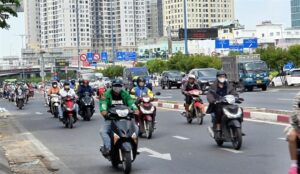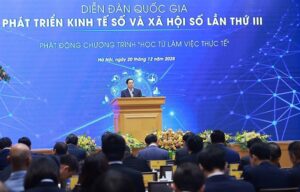Prime Minister Chính Emphasizes Comprehensive Transport Infrastructure as Key to Mekong Delta’s Growth

Cần Thơ, The Gulf Observer: Unlocking the full potential of all modes of transport — including road, air, maritime, inland waterways, and rail — is crucial for lifting the Mekong Delta out of poverty and advancing its socio-economic development, Prime Minister Phạm Minh Chính stated on Monday.
Speaking at a high-level conference in Cần Thơ City to assess the progress of major transport infrastructure projects in southern Việt Nam, the Prime Minister underscored the need for each generation to contribute to building a more prosperous and connected Mekong Delta.
Under the national road network plan for 2021–2030 with a vision to 2050, the region is set to have 1,256 kilometres of expressways, comprising three vertical and three horizontal axes. Of these, 121km have already been completed, including key segments such as Bến Lức – Trung Lương – Mỹ Thuận (91km), Mỹ Thuận – Cần Thơ (23km), and the Mỹ Thuận 2 Bridge (7km).
From 2021 to 2025, ten expressway projects covering 432km are underway. An additional 703km of expressways are being prepared, including the Cà Mau – Đất Mũi route, a strategic 90km link.
PM Chính highlighted that strong Government oversight, alongside the cooperation of local authorities, has resolved several key challenges — notably land clearance and the supply of construction materials — allowing for smoother project execution.
Among the major projects in progress are the 110km Cần Thơ – Cà Mau expressway (completion by 2025); the 191km Châu Đốc – Cần Thơ – Sóc Trăng route (completion by July 2026); and the Cao Lãnh – An Hữu road (completion by 2027). Other projects include Mỹ An – Cao Lãnh, with construction starting in June 2025, and segments of Hồ Chí Minh Road, as well as the Rạch Miễu 2 Bridge, all scheduled for completion within the year.
The region’s aviation network includes four operational airports — Cần Thơ, Cà Mau, Rạch Giá, and Phú Quốc. Plans are in place to invest in a high-speed rail line between Hồ Chí Minh City and Cần Thơ (174km) before 2030, with a possible extension to Cà Mau under review.
In maritime transport, the delta boasts 12 seaports across all provinces, complemented by a growing network of inland waterways and logistics corridors.
PM Chính outlined three essential requirements for all infrastructure projects: on-time or early completion, high construction quality, and strict budget discipline. He stressed the need to eliminate corruption and ensure full compliance with environmental standards.
He directed the Ministry of Construction to issue guidance next week on applying modern construction technologies and called for an expedited reallocation of sand and mining rights among projects to ensure efficient resource use. The Ministry of Finance was tasked with securing sufficient funding for all projects.
Drawing parallels to the historic Great Spring Victory of 1975, the Prime Minister urged faster, bolder, and more ambitious efforts in infrastructure development, asserting that each year and government term must outperform the last. He emphasized a long-term strategic vision that places national interests above all else.
By the end of the current term, the Mekong Delta is expected to have 600km of expressways, with the ultimate goal of reaching at least 1,300km by 2030 — surpassing initial targets by 100km.
Expansion plans are also being developed for Phú Quốc, Cà Mau, and Rạch Giá airports, with local authorities responsible for ensuring land availability. Key port projects include Cái Cui, Trần Đề, and Hòn Khoai, which are expected to serve as logistics hubs for the region.
PM Chính concluded by underscoring the principles of transparent, inclusive, and accountable development, with clearly defined responsibilities, timelines, and outcomes. He reaffirmed the Government’s commitment to ensuring that the benefits of development are equitably shared by the State, people, and businesses, while firmly rejecting corruption and waste of public resources.
Beyond transport, additional Government initiatives will address pressing challenges such as land subsidence, erosion, and salinity intrusion, while also promoting healthcare, education, and human capital development across the Mekong Delta.


